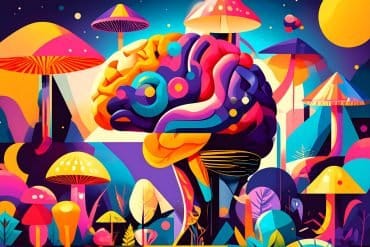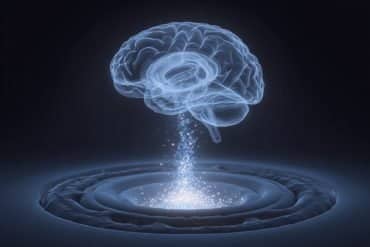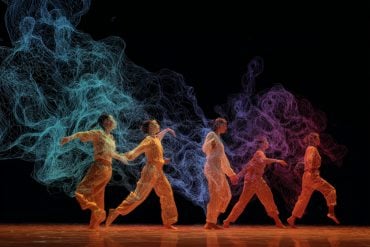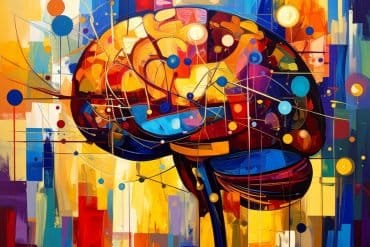Summary: The antidepressant effect of psilocybin-assisted therapy, in combination with psychotherapy, appears to provide up to a year of symptom relief for some patients with major depressive disorder.
Source: Johns Hopkins Medicine
Previous studies by Johns Hopkins Medicine researchers showed that psychedelic treatment with psilocybin relieved major depressive disorder symptoms in adults for up to a month. Now, in a follow-up study of those participants, the researchers report that the substantial antidepressant effects of psilocybin-assisted therapy, given with supportive psychotherapy, may last at least a year for some patients.
A report on the new study was published on Feb. 15, 2022 in the Journal of Psychopharmacology.
“Our findings add to evidence that, under carefully controlled conditions, this is a promising therapeutic approach that can lead to significant and durable improvements in depression,” says Natalie Gukasyan, M.D., assistant professor of psychiatry and behavioral sciences at the Johns Hopkins University School of Medicine.
She cautions, however, that “the results we see are in a research setting and require quite a lot of preparation and structured support from trained clinicians and therapists, and people should not attempt to try it on their own.”
Over the last 20 years, there has been a growing renaissance of research with classic psychedelics — the pharmacological class of compounds that include psilocybin, an ingredient found in so-called magic mushrooms.
According to the National Institute on Drug Abuse, psilocybin can produce perceptual changes, altering a person’s awareness of their surroundings and of their thoughts and feelings. Treatment with psilocybin has shown promise in research settings for treating a range of mental health disorders and addictions.
For this study, the researchers recruited 27 participants with a long-term history of depression, most of whom had been experiencing depressive symptoms for approximately two years before recruitment. The average age of participants was 40, 19 were women, and 25 identified as white, one as African American and one as Asian. Eighty-eight percent of the participants had previously been treated with standard antidepressant medications, and 58% reported using antidepressants in their current depressive episodes.
After screening, participants were randomized into one of two groups in which they received the intervention either immediately, or after an eight-week waiting period. At the time of treatment, all participants were provided with six to eight hours of preparatory meetings with two treatment facilitators.
Following preparation, participants received two doses of psilocybin, given approximately two weeks apart between August 2017 and April 2019 at the Behavioral Biology Research Center at Johns Hopkins Bayview Medical Center. Participants returned for follow-up one day and one week after each session, and then at one, three, six and 12 months following the second session; 24 participants completed both psilocybin sessions and all follow-up assessment visits.
The researchers reported that psilocybin treatment in both groups produced large decreases in depression, and that depression severity remained low one, three, six and 12 months after treatment. Depressive symptoms were measured before and after treatment using the GRID-Hamilton Depression Rating Scale, a standard depression assessment tool, in which a score of 24 or more indicates severe depression, 17–23 moderate depression, 8–16 mild depression and 7 or less no depression.
For most participants, scores for the overall treatment decreased from 22.8 at pretreatment to 8.7 at one week, 8.9 at four weeks, 9.3 at three months, 7 at six months and 7.7 at 12 months after treatment.
Participants had stable rates of response to the treatment and remission of symptoms throughout the follow-up period, with 75% response and 58% remission at 12 months.
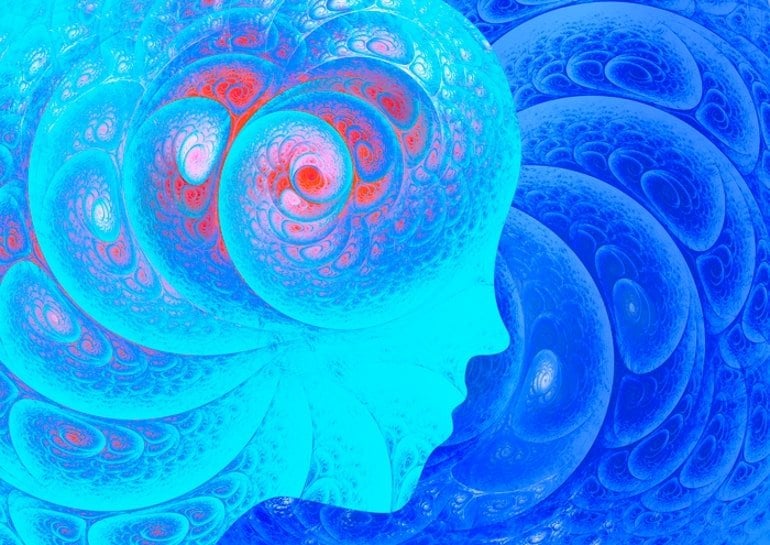
“Psilocybin not only produces significant and immediate effects, it also has a long duration, which suggests that it may be a uniquely useful new treatment for depression,” says Roland Griffiths, Ph.D., the Oliver Lee McCabe III, Ph.D., Professor in the Neuropsychopharmacology of Consciousness at the Johns Hopkins University School of Medicine, and founding director of the Johns Hopkins Center for Psychedelic and Consciousness Research.
“Compared to standard antidepressants, which must be taken for long stretches of time, psilocybin has the potential to enduringly relieve the symptoms of depression with one or two treatments.”
The researchers emphasize that further research is needed to explore the possibility that the efficacy of psilocybin treatment may be substantially longer than 12 months. Johns Hopkins is one of the sites of a national multisite randomized, placebo-controlled trial of psilocybin for major depressive disorder.
Other researchers who contributed to the study are Alan Davis, Frederick Barrett, Mary Cosimano, Nathan Sepeda and Matthew Johnson from the Johns Hopkins University School of Medicine.
Funding: The study was funded in part by a crowd-sourced campaign organized by Tim Ferriss and by grants from the Riverstyx Foundation and Dave Morin. Support for Alan Davis and Natalie Gukasyan was provided by a grant from the National Institutes of Health (T32DA07209, National Institute on Drug Abuse). Support for authors was also provided by the Center for Psychedelic and Consciousness Research, which is funded by the Steven and Alexandra Cohen Foundation, Tim Ferriss, Matt Mullenweg, Craig Nerenberg and Blake Mycoskie. The funders had no role in study design, data collection and analysis, or in decision to publish or manuscript preparation.
COI: Alan Davis is a board member of Source Research Foundation. Matthew Johnson has received grant support from the Heffter Research Institute that is unrelated to this study, and he is an advisor to the following companies: AJNA Labs, AWAKN Life Sciences, Beckley Psytech, Entheon Biomedical, Field Trip Psychedelics, Mind Medicine, Otsuka Pharmaceutical Development & Commercialization and Silo Pharma. Roland Griffiths is a board member of the Heffter Research Institute and has received grant support from the institute unrelated to this study. Griffiths is site principal investigator, and Johnson and Gukasyan are co-investigators for a multisite trial of psilocybin-assisted therapy for major depressive disorder sponsored by Usona Institute.
About this psychopharmacology research news
Author: Marisol Martinez
Source: Johns Hopkins Medicine
Contact: Marisol Martinez – Johns Hopkins Medicine
Image: The image is credited to JHU
Original Research: Closed access.
“Efficacy and safety of psilocybin-assisted treatment for major depressive disorder: Prospective 12-month follow-up” by Natalie Gukasyan et al. Journal of Psychopharmacology
Abstract
Efficacy and safety of psilocybin-assisted treatment for major depressive disorder: Prospective 12-month follow-up
Background:
Preliminary data suggest that psilocybin-assisted treatment produces substantial and rapid antidepressant effects in patients with major depressive disorder (MDD), but little is known about long-term outcomes.
Aims:
This study sought to examine the efficacy and safety of psilocybin through 12 months in participants with moderate to severe MDD who received psilocybin.
Methods:
This randomized, waiting-list controlled study enrolled 27 patients aged 21–75 with moderate to severe unipolar depression (GRID-Hamilton Depression Rating Scale (GRID-HAMD) ⩾ 17). Participants were randomized to an immediate or delayed (8 weeks) treatment condition in which they received two doses of psilocybin with supportive psychotherapy. Twenty-four participants completed both psilocybin sessions and were followed through 12 months following their second dose.
Results:
All 24 participants attended all follow-up visits through the 12-month timepoint. Large decreases from baseline in GRID-HAMD scores were observed at 1-, 3-, 6-, and 12-month follow-up (Cohen d = 2.3, 2.0, 2.6, and 2.4, respectively). Treatment response (⩾50% reduction in GRID-HAMD score from baseline) and remission were 75% and 58%, respectively, at 12 months. There were no serious adverse events judged to be related to psilocybin in the long-term follow-up period, and no participants reported psilocybin use outside of the context of the study. Participant ratings of personal meaning, spiritual experience, and mystical experience after sessions predicted increased well-being at 12 months, but did not predict improvement in depression.
Conclusions:
These findings demonstrate that the substantial antidepressant effects of psilocybin-assisted therapy may be durable at least through 12 months following acute intervention in some patients.



